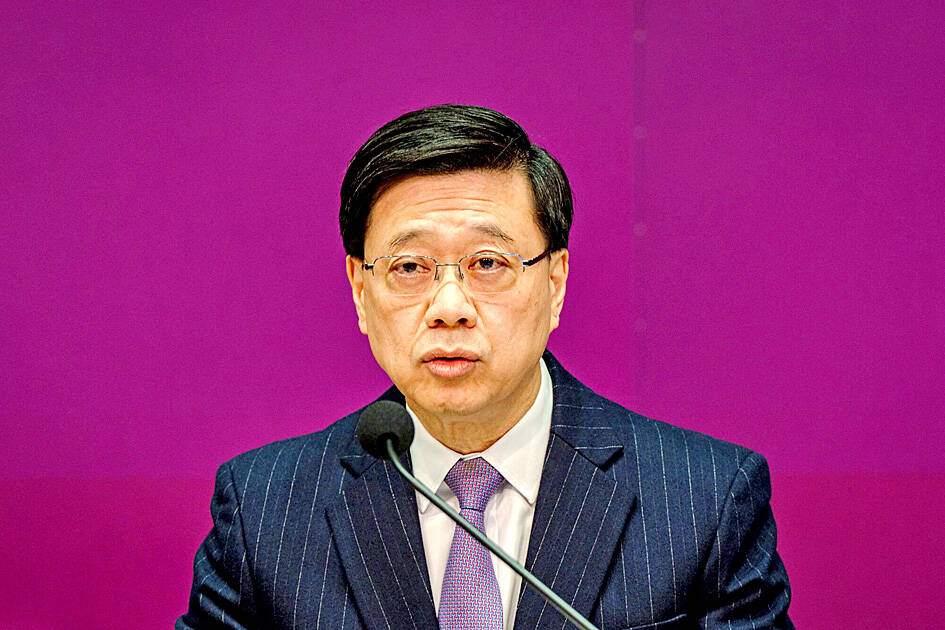Hong Kong’s leader yesterday announced that the territory would urgently create a new security law to crush pro-independence threats, nearly four years after authorities extinguished a huge democracy movement.
The law would expand on legislation imposed by China in June 2020 to silence dissent, adding crimes such as insurrection and external interference.
The new law, which the government said it would open up to public consultation, would bolster the authorities’ ability to crack down on perceived threats.

Photo: Bloomberg
“While the society as a whole looks calm and very safe, we still have to watch out for potential sabotage and undercurrents that try to create troubles, particularly when some of the ‘independent Hong Kong’ ideas are still being embedded in some people’s mind,” Hong Kong Chief Executive John Lee (李家超) told a news conference.
“The threats to national security are real, we have experienced them and suffered from them badly ... we don’t want to go through that painful experience again,” he said, adding that “some foreign agents may still be active in Hong Kong.”
The Hong Kong government’s first attempt in 2003 to introduce its own national security law was shelved after about 500,000 people took to the streets in protest. The semi-autonomous territory has since seen other waves of dissent, including in 2019 when hundreds of thousands of people participated in sometimes violent protests calling for greater freedoms.
In response, Beijing in 2020 imposed a National Security Law to punish four crimes — secession, subversion, terrorism and collusion with foreign forces — with sentences of up to life in prison.
Officials yesterday said that the territory’s own law, defined under Article 23 of the Basic Law, would also punish a raft of new crimes — treason, insurrection, espionage, destructive activities endangering national security and external interference.
Lee said authorities would engage with local and foreign groups in a consultation process on the law until the end of next month.

SECURITY: As China is ‘reshaping’ Hong Kong’s population, Taiwan must raise the eligibility threshold for applications from Hong Kongers, Chiu Chui-cheng said When Hong Kong and Macau citizens apply for residency in Taiwan, it would be under a new category that includes a “national security observation period,” Mainland Affairs Council (MAC) Minister Chiu Chui-cheng (邱垂正) said yesterday. President William Lai (賴清德) on March 13 announced 17 strategies to counter China’s aggression toward Taiwan, including incorporating national security considerations into the review process for residency applications from Hong Kong and Macau citizens. The situation in Hong Kong is constantly changing, Chiu said to media yesterday on the sidelines of the Taipei Technology Run hosted by the Taipei Neihu Technology Park Development Association. With

A US Marine Corps regiment equipped with Naval Strike Missiles (NSM) is set to participate in the upcoming Balikatan 25 exercise in the Luzon Strait, marking the system’s first-ever deployment in the Philippines. US and Philippine officials have separately confirmed that the Navy Marine Expeditionary Ship Interdiction System (NMESIS) — the mobile launch platform for the Naval Strike Missile — would take part in the joint exercise. The missiles are being deployed to “a strategic first island chain chokepoint” in the waters between Taiwan proper and the Philippines, US-based Naval News reported. “The Luzon Strait and Bashi Channel represent a critical access

‘FORM OF PROTEST’: The German Institute Taipei said it was ‘shocked’ to see Nazi symbolism used in connection with political aims as it condemned the incident Sung Chien-liang (宋建樑), who led efforts to recall Democratic Progressive Party (DPP) Legislator Lee Kun-cheng (李坤城), was released on bail of NT$80,000 yesterday amid an outcry over a Nazi armband he wore to questioning the night before. Sung arrived at the New Taipei City District Prosecutors’ Office for questioning in a recall petition forgery case on Tuesday night wearing a red armband bearing a swastika, carrying a copy of Adolf Hitler’s Mein Kampf and giving a Nazi salute. Sung left the building at 1:15am without the armband and apparently covering the book with a coat. This is a serious international scandal and Chinese

COUNTERINTELLIGENCE TRAINING: The ministry said 87.5 percent of the apprehended Chinese agents were reported by service members they tried to lure into becoming spies Taiwanese organized crime, illegal money lenders, temples and civic groups are complicit in Beijing’s infiltration of the armed forces, the Ministry of National Defense (MND) said in a report yesterday. Retired service members who had been turned to Beijing’s cause mainly relied on those channels to infiltrate the Taiwanese military, according to the report to be submitted to lawmakers ahead of tomorrow’s hearing on Chinese espionage in the military. Chinese intelligence typically used blackmail, Internet-based communications, bribery or debts to loan sharks to leverage active service personnel to do its bidding, it said. China’s main goals are to collect intelligence, and develop a